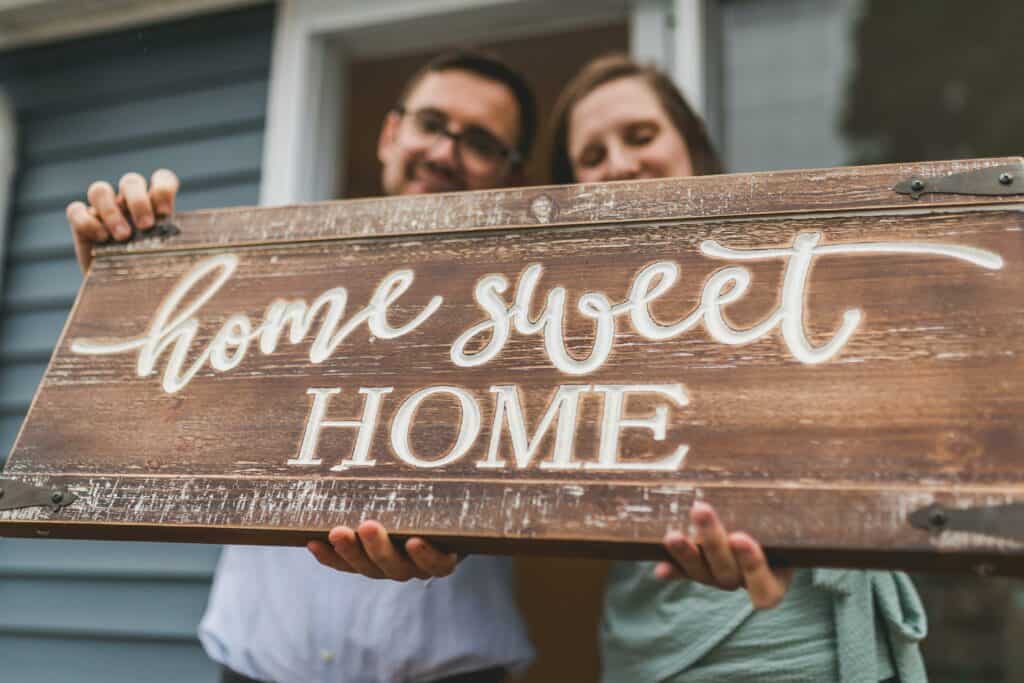
First Time Buyer
A First time buyer is someone who hasn’t previously purchased land or property.
What is a Mortgage?
So, imagine you want to buy a house but don’t have all the money upfront. A mortgage is like a loan from a bank or a lender that helps you buy the house. You pay a part of the house price as a deposit, usually at least 5%, and the rest is the mortgage.
You then make monthly payments to the bank over a period, often around 25 years, which includes the money you borrowed plus some extra (interest). The catch is, the house itself is like a promise to the bank – if you can’t make the payments, they can take the house back and sell it to get their money back.
First time buyers are folks who are buying their first-ever house and haven’t owned one before. It’s a way for people to get into the property market even if they don’t have all the money upfront.
What deposit do I need as a first time buyer?
When you’re planning to buy a home, it’s important to save up for a deposit before you start looking at properties. Usually, you should aim to save around 5% of the total cost of the home you want to buy. For instance, if the home you’re eyeing is priced at £150,000, you’d need to save at least £7,500 as a 5% deposit.
If you’re able to save more than 5%, it’s even better. Having a larger deposit gives you more options for getting a mortgage with better terms and a lower interest rate. So, while 5% is the minimum, saving more can be really beneficial in the long run.
Loan to Value
Loan to Value’ or LTV. Basically, LTV is a comparison between the amount you’ve borrowed for your home and the value of the property according to the mortgage lender.
Here’s an example: If you purchase a home for £200,000, put down £20,000 as a deposit, and take out a mortgage of £180,000, your LTV is 90%. This is because the borrowed amount (£180,000) is 90% of the home’s value (£200,000).
Now, the interesting part is that the lower your LTV, the better your interest rate tends to be. This is because when you have a smaller loan relative to the property’s value, the lender sees less risk.
The most attractive rates usually go to folks with a 40% deposit, which translates to a 60% LTV. So, a lower LTV not only gives you a better rate but also shows the lender you’re a safer bet.
Make sure that the monthly payments fit comfortably within your budget
if you’re a first-time buyer, the key consideration is whether you can genuinely manage this move.
Before you even begin house hunting, creating a budget is a smart move. Take a moment to figure out how much you can comfortably pay each month. And don’t forget, you’ll still need to cover your day-to-day expenses like utilities and groceries. This will help ensure that you’re not only ready to buy a home but also equipped to manage all the other costs that come with it.
Don’t forget to budget for other costs.
In addition to your monthly mortgage payments, there are other expenses you need to consider when purchasing a home. These include:
- Stamp Duty (Land and Buildings Transaction Tax in Scotland, or Land Transaction Tax in Wales)
- Survey costs
- Solicitor or conveyancer fees (this often includes extra costs, such as search and Land Registry fees)
- Mortgage arrangement and valuation fees
- Removal and moving in costs
- Buildings insurance
- Initial furnishing and decorating costs
Remember that these costs can add up, so it’s important to factor them into your overall budget when planning to buy a home.
Where to go to get a mortgage?
There are a couple of routes you can take when applying for mortgages. You can go directly to a bank or building society, or you might consider using a regulated mortgage adviser.
Our advisers are well-versed in the mortgage market and can assist you in finding the best mortgage for your specific situation. This can be especially helpful if:
- You have a small deposit
- You’re self-employed
- Your situation involves particular circumstances, like needing a mortgage for a shared ownership scheme or a unique property type.
- Their expertise can really make navigating the mortgage landscape smoother and more tailored to your needs
What is Freehold and Leasehold
When you to purchase a house, it’s common to buy the freehold. This signifies that you own both the property and the land it’s built on.
On the other hand, if you’re looking to buy a flat, you’ll typically acquire a leasehold or become a part-owner of the freehold in a shared arrangement.
What Mortgage do I choose?
Understanding the different mortgage options available is key to making the right decision.
Start by considering the interest rate. Often, you might begin with a fixed rate deal for a specific period. After that, you usually transition to your lender’s standard variable rate. You can switch to another mortgage with your current lender or remortgage with a new one.
The most common type is a repayment mortgage, where you make monthly payments that cover both the borrowed amount and the interest.
Another kind is the ‘interest only’ mortgage, although these are more common for buy-to-let mortgages. With these, you’re mostly covering the interest and not the borrowed amount itself.
The mortgage application process.
During the application process, you’ll have to show proof of your income, existing credit obligations, and your spending habits. If you’re self-employed, you’ll also need to provide tax returns and business accounts for the past two or three years.
Lenders conduct an affordability assessment, which is a thorough examination of your financial situation. This helps them determine if you can manage the long-term mortgage payments comfortably. It’s a detailed process, but it ensures that you’re getting a mortgage that aligns with your financial capability.
First time buyer checklist
To simplify things, here’s a first-time home buyer checklist to guide you through the journey:
- Save for a Deposit: Before diving into home buying, ensure you’ve saved up a deposit. Typically, this ranges from 5% to 20% of the home’s value.
- Budget for Fees: Factor in necessary fees like solicitor fees and stamp duty in your budgeting.
- Consult a Mortgage Advisor or approach your lender: Speak to a mortgage advisor or your bank to determine how much you can afford. Provide accurate financial details for an honest assessment.
- Get a Mortgage in Principle: Obtain a mortgage in principle from your chosen lender. It’s a commitment that they’ll contribute a specific amount towards your new home.
- Explore Homes: Attend property viewings and explore a range of options to pinpoint what suits your needs.
- Make an Offer: Put in an offer on a property you love. While it needn’t match the full price, it shouldn’t be too low to be accepted.
- Survey the Property: Once your offer is accepted, get a property survey done. This identifies both structural and cosmetic issues.
- Exchange Contracts: Follow the legal process for exchanging contracts, ensuring all details are accurate and satisfactory.
- Ownership: Once all the steps are completed, you’ll become the proud owner of your first home.
Why is the first mortgage payment higher?
The initial mortgage payments might be higher than your regular monthly payments. That’s because they include interest from the day the funds were released up until the end of that month, along with the payment for the upcoming month. This structure ensures that you’re getting the mortgage payment cycle in sync with the calendar month.
Can a first-time buyer rent out their property?
Generally, first-time buyers can’t rent their property. That’s because the lender approved the mortgage for a residential home, not a buy-to-let property. In certain circumstances you can ask the lender for consent to let. Where a lender grants consent to let the property, it means they’re permitting you to rent out your house while you still have a residential mortgage. However, this permission usually has a time limit, typically lasting for 6 to 12 months. Consent to let is ideal if you intend to rent out your property for a temporary period, as it’s not a long-term arrangement. Always make sure to understand the terms and conditions of consent to let from your lender.
Can I get a Buy to let as a First-time buyer?
Indeed, a first-time buyer can apply for a buy-to-let mortgage, but it might be more challenging compared to those who have owned property before. The availability of buy-to-let mortgages for first-time buyers is limited, accounting for roughly a fifth of the market. Additionally, you might need to provide a larger deposit when seeking such a mortgage. It’s advisable to research thoroughly and consult with a mortgage adviso to understand your options and requirements.
Who qualifies as a first-time buyer UK?
A first-time buyer is typically someone who is purchasing their primary or main residence and hasn’t previously owned a freehold or leasehold interest in a residential property, whether in the UK or abroad. This definition helps distinguish those who are entering the property market for the first time from those who have owned property before.
Can you be a first-time buyer at 40?
Being a first-time buyer over 40 shouldn’t necessarily pose a problem. Many lenders consider your age at the end of the mortgage term rather than the beginning. This is because the assessment for mortgages primarily revolves around your income, which is often tied to your salary. So, as long as you meet the income and affordability criteria, being over 40 doesn’t automatically disqualify you as a first-time buyer.
How much deposit do first-time buyers need for a mortgage?
When it comes to first-time buyer mortgages, you’re usually aiming for a 90% or 95% mortgage deal, which implies having a 5% or 10% deposit saved up. When borrowing money, regardless of the situation, the key factors include your credit history, income, and the lender’s assessment of your ability to make repayments. So, the specific terms of your mortgage deal will be influenced by these elements.
Understand Your Credit File
When greeting ready to apply for a mortgage it’s essential you understand your credit history.
We recommend Check My File who offer a 30 day free trial (usually £14.99 per month, you can cancel at anytime)
The Check My File Report provides you with a summary from three different credit reference agencies (Experian, Equifax & TransUnion).
Mortgage lenders use different credit reference agencies and you are able to see what the lender see prior to making any applications.
Why Mondo Mortgages
- Raising The standards of financial advice
- Making financial advice accessible to all
- Trusted & stress-free financial advice
- Friendly, personable advisors
